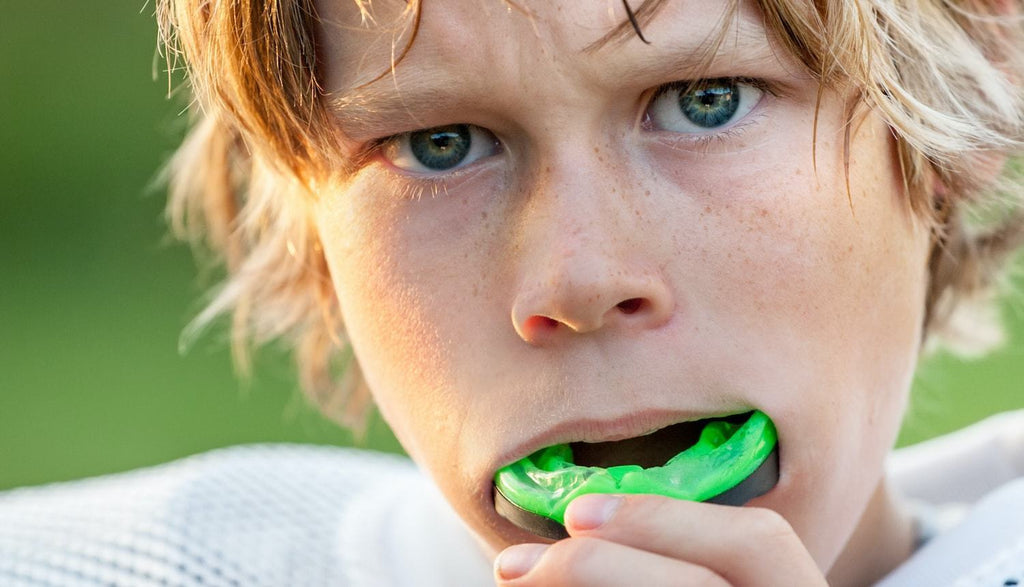If your child plays sports, he or she probably wears a variety of safety gear such as helmets, knee pads, or goggles. But what about mouth guards? Perhaps because they’re not required for every sport, many parents wonder if wearing a mouth guard is really that important.
We’re here to tell you yes! Child mouth guards are highly important for sports– and we don’t just mean hockey!
Still not convinced? It’s estimated that over 3 million teeth are knocked out every year in child sports - yikes!
Read on to discover more essential reasons why your child should wear a mouth guard.
Why Wear a Mouth Guard?
First and foremost, if you want to avoid rushing your child to the dentist because of chipped, broken, or knocked out teeth, we highly recommend investing in a mouth guard.
According to the American Dental Association (ADA), mouth guards prevent more than 200,000 oral injuries every year!
But it’s not just teeth that mouth guards protect. These marvelous multitaskers also protect your child’s tongue, face, and lips. If that wasn’t enough, they cushion blows to the face, thereby reducing the severity of the injury.
Which Sports Require Mouth Guards?
The top sports that involve the biggest risk of mouth injury, such as lost or damaged teeth, include:
- Hockey
- Baseball
- Basketball
- Football
- Soccer
- Rugby
- Lacrosse
That being said, even non-contact sports can benefit from wearing a mouth guard. These include mountain biking, gymnastics, skateboarding, and even climbing.
Types of Child Sport Mouth Guards
There are three different types of mouth guards:
Custom-Fitted: Made by the dentist to offer maximum protection and comfort, these are the most expensive (and safest) option.
Stock: These pre-formed mouth protectors come ready to wear and can be found at most sport shops. A one-size-fits-all deal, they usually cost around $15. Unfortunately, they can be quite bulky (especially for little mouths!) and can make talking difficult.
Boil-and-Bite: Also available at sport stores, these mouth guards are first softened in water and then placed in the mouth. This allows them to shape to the teeth, allowing for a more customized fit.
Regardless of which type your child uses, make sure that it fits properly and feels comfortable (otherwise, it might be a bit of a struggle getting your child to actually wear it on a regular basis). In addition, make sure the mouth guard is durable, easy to clean, and doesn’t affect the way they talk or breathe.
How to Care for your Mouth Guard
Like a retainer, the mouth guard is an ideal breeding ground for germs and bacteria, making cleaning the mouth guard an important task. Here are our top tips for mouth guard care:
- Be sure to rinse the mouth guard before and after each use. Every so often, clean it with lukewarm, soapy water. Don’t forget to rinse thoroughly afterwards!
- Never expose the mouth guard to sun or heat (this includes hot water).
- Make it easy for your child to safely store and transport his or her mouth guard. We recommend our sturdy RooTainer protective cases. The extra ventilation helps the mouthpiece dry quickly and the clip option makes it easily portable, while reducing the risk of your child misplacing it.
- Don’t forget to check your child’s mouth guard for wear-and-tear. Replace when necessary.
Other Tips:
While games tend to be more intense, your child’s mouth is at risk during practices as well. Don’t forget to pack it and make sure they wear it! Finally, remind your child not to chew his or her mouth guard as this will decrease its effectiveness over time.
References:
https://www.perfectteeth.com/blog/mouthguards-important-kids-sports/


